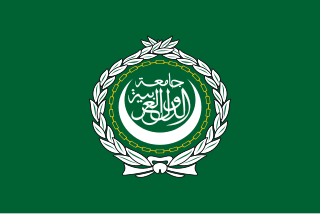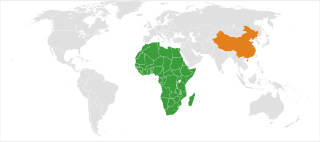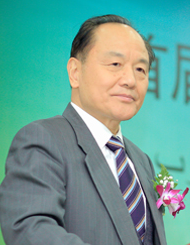
The Arab League, formally the League of Arab States, is a regional organization in the Arab world, which is located in Northern Africa, Western Africa, Eastern Africa, and Western Asia. The Arab League was formed in Cairo on 22 March 1945, initially with six members: Egypt, Iraq, Transjordan, Lebanon, Saudi Arabia, and Syria. Yemen joined as a member on 5 May 1945. Currently, the League has 22 members.
A special economic zone (SEZ) is an area in which the business and trade laws are different from the rest of the country. SEZs are located within a country's national borders, and their aims include increasing trade balance, employment, increased investment, job creation and effective administration. To encourage businesses to set up in the zone, financial policies are introduced. These policies typically encompass investing, taxation, trading, quotas, customs and labour regulations. Additionally, companies may be offered tax holidays, where upon establishing themselves in a zone, they are granted a period of lower taxation.
The Five Principles of Peaceful Coexistence are the Chinese government's foreign relations principles first mentioned in the 1954 Sino-Indian Agreement. Also known as Panchsheel, these principles were subsequently adopted in a number of resolutions and statements, including the preamble to the Constitution of the People's Republic of China.
China is one of the charter members of the United Nations and is one of five permanent members of its Security Council.
In justifying opening up and the series of economic reforms that ensued, Deng referred to Marx and his theories, which predicted that nations need to undergo urbanization and a stage of capitalism for a natural socialist transition. One of the most renowned reforms under Deng was establishing four "special economic zones" along the Southeastern coast of China, with Shenzhen, Shantou, and Zhuhai located in Guangdong province and Xiamen located in Fujian province. Special economic zones (SEZs) in mainland China are granted more free market-oriented economic policies and flexible governmental measures by the government of China, compared to the planned economy elsewhere.

The African Union Commission (AUC) acts as the executive/administrative branch or secretariat of the African Union. It consists of a number of Commissioners dealing with different areas of policy. The African Union Headquarters are in Addis Ababa, Ethiopia. It should be distinguished from the African Commission on Human and Peoples' Rights,, which is a separate body that reports to the African Union.
Go Out policy is the People's Republic of China's current strategy to encourage its enterprises to invest overseas.

The Forum on China–Africa Cooperation (FOCAC) simplified Chinese: 中非合作论坛; traditional Chinese: 中非合作論壇; pinyin: Zhōng Fēi hézuò lùntán; French: Forum sur la coopération sino-africaine) is an official forum between the People's Republic of China and all states in Africa with the exception of the Kingdom of Eswatini. It is the primary multi-lateral coordination mechanism between African countries and China and since 2018 is viewed by those countries as a cooperation platform within the Belt and Road Initiative.
Zhai Jun is a Chinese diplomat, who has served as China's Special Envoy on the Middle Eastern Issue since 2019. As of 2022, he was the incumbent in the position. Previously, he served as Deputy Foreign Minister from 2009 to 2014, and was appointed Chinese ambassador to France in January 2014, replacing Kong Quan.
National champions are corporations which are technically private businesses but due to governmental policy are ceded a dominant position in a national economy. In this system, these large organizations are expected not only to seek profit but also to "advance the interests of the nation"; the government sets policies which favor these organizations. The policy is practiced by many governments, in some sectors more than others, but by giving an unfair advantage against market competition, the policy promotes economic nationalism domestically and global pre-eminence abroad contrary to the free market. The policy also deters or prevents venture capitalism.
South–South cooperation (SSC) is a term historically used by policymakers and academics to describe the exchange of resources, technology, and knowledge between developing countries, also known as countries of the Global South. The Global South is making increasingly significant contributions to global development. The economic and geopolitical relevance of many countries has grown. In the past, south-south cooperation focused on sharing knowledge and building capacities, but the countries of the Global South and new financial institutions have recently also become increasingly active in development finance.

China–Syria relations are foreign relations between China and Syria. The nationalist government of China recognized Syria in 1946. Diplomatic relations between both countries were established on August 1, 1956. China has an embassy in Damascus and Syria has an embassy in Beijing, the two governments generally maintaining a friendly political and economic relationship for the last several decades, which continues to endure despite the Syrian civil war.

Sino-African relations or Afro-Chinese relations are the historical, political, economic, military, social, and cultural connections China and the African continent.
The China-Africa Development Fund, more commonly known as CAD Fund, is a Chinese private equity fund solely funded by China Development Bank, a Chinese government policy bank. The aim of the fund is to stimulate investment in Africa by Chinese companies in power generation, transportation infrastructure, natural resources, manufacturing, and other sectors.

Wu Sike is a senior diplomat of the People's Republic of China. He succeeded Sun Bigan in 2009 as China's Special Envoy on the Middle East Issue, serving in that position until 2014. Before assuming the office, he served successively as Chinese Ambassador to Saudi Arabia from 2000 to 2003 and Ambassador to Egypt from 2003 to 2007. Wu started to learn the Arabic language in 1965, when he was admitted to Beijing International Studies University.
Chinese foreign aid may be considered as both governmental (official) and private development aid and humanitarian aid originating from the People’s Republic of China.
Gong Xiaosheng is a Chinese ambassador.
The China–Arab States Cooperation Forum (CASCF) is a formal dialogue initiative between China and the Arab League established in 2004. It serves as the primary multilateral coordination mechanism between China and the Arab states.
Sun Bigan was a Chinese diplomat who served as the ambassador to several Middle Eastern countries and as China’s Special Envoy on Middle East Issues.

China–Lebanon relations, also referred to as the Sino-Lebanese relations, refer to the bilateral relationship between China and Lebanon.







